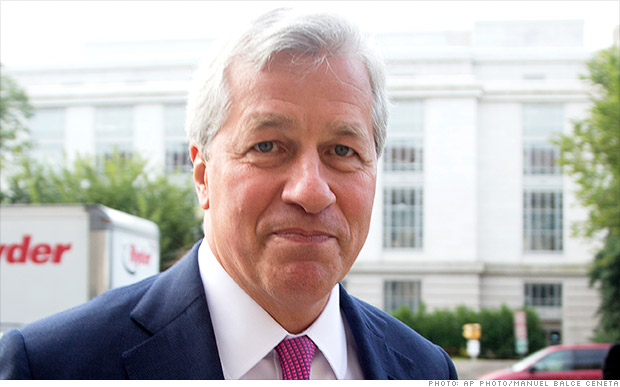 NEW YORK (CNNMoney) JPMorgan Chase CEO Jamie Dimon expressed more optimism about the economy, but that's not reflected in his company's earnings.
NEW YORK (CNNMoney) JPMorgan Chase CEO Jamie Dimon expressed more optimism about the economy, but that's not reflected in his company's earnings. The nation's largest bank by assets earned $5.3 billion, or $1.28 per share, in the first three months of 2014. That was down sharply from the first quarter of 2013 and was below analysts' forecasts. Revenue fell 8% from the same period last year, to $23.9 billion.
Shares of JPMorgan (JPM, Fortune 500) plunged 4% in early trading.
The news may not be good for the many others in the banking sector -- and investors overall. JPMorgan was the first major financial firm to report its results.
But another big bank fared much better than JPMorgan. Wells Fargo (WFC, Fortune 500) reported a 14% jump in profit from a year ago Friday. Earnings topped estimates, but Wells Fargo's stock was down slightly.
Citigroup (C, Fortune 500), Bank of America (BAC, Fortune 500), Morgan Stanley (MS, Fortune 500) and Goldman Sachs (GS, Fortune 500) will release their results next week and expectations are low for those four banks as well.
Stocks plunged on Thursday and there were some hopes that good news from banks might help to stabilize the market. But stocks were down again Friday morning.
Still, Dimon said in a press release that the bank has "growing confidence in the economy." He added that "consumers, corporations and middle market companies are in increasingly good financial shape and housing has turned the corner in most markets." -- and we are doing our part to support the recovery."
But the bank's profits were hurt in the quarter by a slowdown in mortgages and bond trading. But it does look like the average consumer is both saving and spending more. Deposits rose and so did credit card volume.
Another bright spot was a 29% jump in fees from underwriting initial public offerings and other stock sales.
The bank has also had its fair share of legal headaches in the past year.
Early in the first quarter, JPMorgan agreed to pay $2.6 billion to settle lawsuits stemming from its relationship with disgraced financier Bernard Madoff. It also announced a record $13 billion settlement with the Justice Department in November to resolve allegations linked to the sale of risky mortgage securities during the housing bubble.
 Why big banks are too big to jail
Why big banks are too big to jail Best Value Stocks To Own Right Now
But investors seem to have confidence that the bank's legal woes are mostly behind it. Although the stock is down so far in 2014, shares have gained more than 16% in the past 12 months.
And the market still seems to have faith in Dimon. But there are some concerns about who might eventually succeed him. There has been a bit of a brain drain at the bank lately.
Michael Cavanagh, who many viewed as the most likely JPMorgan executive to one day take over for Dimon, left last month to take a job at private equity titan Caryle Group (CG).
Not that Dimon is going anywhere just yet. He has made it clear that he wants to stick around for some time. ![]()

 Popular Posts: 15 Oil and Gas Stocks to Sell Now7 Biotechnology Stocks to Buy Now10 Oil and Gas Stocks to Buy Now Recent Posts: 5 Energy Services Stocks to Buy Now 5 Software Stocks to Buy Now 7 Restaurant and Resort Stocks to Buy Now View All Posts
Popular Posts: 15 Oil and Gas Stocks to Sell Now7 Biotechnology Stocks to Buy Now10 Oil and Gas Stocks to Buy Now Recent Posts: 5 Energy Services Stocks to Buy Now 5 Software Stocks to Buy Now 7 Restaurant and Resort Stocks to Buy Now View All Posts 
